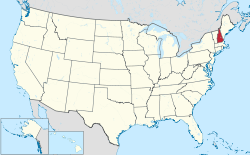 | |
| Number of elections | 59 |
|---|---|
| Voted Democratic | 20 |
| Voted Republican | 28 |
| Voted Democratic-Republican | 5 |
| Voted Federalist | 4 |
| Voted other | 2 [a] |
| Voted for winning candidate | 43 |
| Voted for losing candidate | 16 |
Following is a table of United States presidential elections in New Hampshire, ordered by year.
Contents
- Elections from 1864 to present
- Election of 1860
- Elections from 1828 to 1856
- Election of 1824
- Elections from 1788-89 to 1820
- See also
- Notes
- References
Winners of the state are in bold.